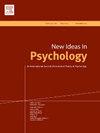Developing the Narrating Identity Questionnaire: A measure of beneficial self-integration and change
IF 2.9
3区 心理学
Q2 PSYCHOLOGY, EXPERIMENTAL
引用次数: 0
Abstract
The present research introduces the Narrating Identity Questionnaire (NIQ), a new measure designed to capture how literary reading can temporally integrate self and other in autobiographical memory, distinguishing productive self-perceptual depth from rumination. The NIQ was developed and validated across three studies with university students. In Study 1, an initial NIQ item pool was administered after a meaningful literary reading experience, and exploratory factor analysis revealed three factors: Memory Transformation, Poignant Bivalent Self-Understanding, and Ruminative Separation and Isolation. In Study 2, the factor structure was cross-validated under a different questionnaire order to test for order effects, and in Study 3, it was confirmed with an added general metaphor comprehension task. The NIQ demonstrated adequate internal consistency and a stable three-factor structure across studies. Importantly, expressive engagement with a text (e.g., deeply identifying with metaphoric content) strongly predicted increased self-understanding (β ≈ 0.70, p < .001) and also some ruminative thought (p < .01), whereas integrative engagement (e.g., taking an analytical perspective on the text) did not directly predict either outcome (βs ∼ 0, n.s.). Expressive engagement accounted for a large portion of variance in self-understanding outcomes (approximately 45–60 %; 95 % CI of β [0.40, 0.98] in Study 1). Although integrative engagement did not directly predict rumination, group-level comparisons indicated a buffering effect: the sample with an added integrative task showed significantly lower rumination scores (M = 2.54) than the original sample (M = 3.21; difference ∼0.67 on a 5-point scale, 95 % CI [0.51, 0.83], p < .001, Cohen's d ≈ 0.76). Together, these findings support the NIQ's capacity to distinguish between healthy self-perceptual depth and maladaptive rumination following literary reading. The discussion highlights theoretical implications for narrative identity development, the dual role of expressive reading in fostering insight versus rumination, and the potential of the NIQ for future research and practical applications. Key strengths, such as the multi-study design and integration of literary theory with psychological measurement, are discussed alongside limitations including sample characteristics and the need for broader validation.
开发叙事认同问卷:有益自我整合与改变的量度
本研究引入了叙述认同问卷(NIQ),这是一种新的测量方法,旨在捕捉文学阅读如何在自传体记忆中暂时整合自我和他者,区分生产性自我知觉深度和反刍。NIQ是通过对大学生的三项研究开发和验证的。在研究1中,在有意义的文学阅读体验后进行初始NIQ项目池,探索性因子分析发现三个因素:记忆转化、尖锐的二价自我理解和反思性分离与孤立。研究2在不同问卷顺序下对因子结构进行交叉验证以检验顺序效应,研究3通过增加一般隐喻理解任务对因子结构进行验证。NIQ在研究中表现出足够的内部一致性和稳定的三因素结构。重要的是,对文本的表达性参与(例如,对隐喻内容的深刻认同)强烈地预测了自我理解的增加(β≈0.70,p <;.001)和一些反刍思维(p <;.01),而整合参与(例如,对文本采取分析视角)并不能直接预测这两种结果(βs ~ 0, n.s.)。表达投入占自我理解结果方差的很大一部分(约45 - 60%;研究1中95% CI为β[0.40, 0.98]。虽然整合参与并不能直接预测反刍,但群体水平的比较显示出缓冲效应:增加整合任务的样本反刍得分(M = 2.54)显著低于原始样本(M = 3.21;在5分制量表上差异为0.67,95% CI [0.51, 0.83], p <;.001, Cohen’s d≈0.76)。总之,这些发现支持NIQ区分健康的自我知觉深度和文学阅读后的不适应反刍的能力。讨论强调了叙事认同发展的理论含义,表达性阅读在培养洞察力和反思性方面的双重作用,以及NIQ在未来研究和实际应用中的潜力。主要优势,如多研究设计和文学理论与心理测量的整合,讨论了局限性,包括样本特征和需要更广泛的验证。
本文章由计算机程序翻译,如有差异,请以英文原文为准。
求助全文
约1分钟内获得全文
求助全文
来源期刊

New Ideas in Psychology
Multiple-
CiteScore
4.80
自引率
3.80%
发文量
37
期刊介绍:
New Ideas in Psychology is a journal for theoretical psychology in its broadest sense. We are looking for new and seminal ideas, from within Psychology and from other fields that have something to bring to Psychology. We welcome presentations and criticisms of theory, of background metaphysics, and of fundamental issues of method, both empirical and conceptual. We put special emphasis on the need for informed discussion of psychological theories to be interdisciplinary. Empirical papers are accepted at New Ideas in Psychology, but only as long as they focus on conceptual issues and are theoretically creative. We are also open to comments or debate, interviews, and book reviews.
 求助内容:
求助内容: 应助结果提醒方式:
应助结果提醒方式:


